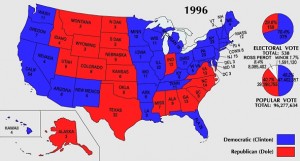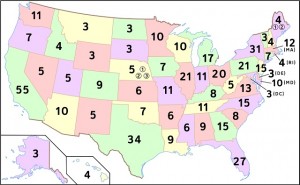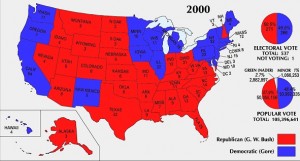Politics / Social Issues
I was in high school during the 1996 Election. I remember being caught up in how great Bob Dole seemed. I totally bought into the storyline that he was a hero, a World War II veteran who had his arm shot up during the war. “What a leader!” I thought. Then he lost the election. I was upset about that. It was the first time I really read up on a Presidential Election. I remember hearing about the Electoral College. I began asking the same questions that I have heard legions of others ask me since: what is the Electoral College? Why aren’t Presidents elected by popular vote? What determines how many Electoral votes each state is allocated? What’s the deal with this crazy system?
What Is The Electoral College?
Contrary to its name, the Electoral College is not a college or a place. It is a process that was established in the Constitution by our forefathers. The process involves the selection of Electors for each state, the coming together by all Electors to cast their votes for the President and Vice President of the party that chose the Electors, and the counting of the votes by Congress.
How Many Electoral Votes Does Each State Have?
Each State is allocated one Electoral Vote for each member of Congress representing that state. Each state gets one vote for each of its two Senators and one additional vote per member of the House of Representatives. The topic of Congressional Districts and members of Congress per state has been previously detailed. While the District of Columbia does not have a vote in Congress, the 23rd Amendment to the Constitution awarded it three votes for purposes of the Electoral College.
How Is The President Elected Given This System?
Each Presidential Candidate and his or her VP have Electors in each state that have been chosen by the party the candidate represents. In most states, the winner takes all. Each Electoral vote is awarded to the candidate with the most popular votes in the state. (The exceptions are Maine and Nebraska.)
How Messed Up Is This System?
Its pretty messed up, otherwise you wouldn’t be asking the question of what it is. An election process should be pretty simple. This process is anything but; however it is the process that we currently have. Its so messed up in fact that a Presidential Candidate can win the popular vote and lose the election because of the Electoral College. This happened, in fact, during the 2000 Presidential Election when Al Gore won the popular vote nationwide and lost in the Electoral College to George W. Bush. Thanks a lot, Florida. Also of note here is that if no candidate is able to emerge the clear winner in the Electoral College, then the deciding vote is given to the House of Representatives.
Why Have The Electoral College System?
The motivation for this system by our founding fathers was the same motivation for many of their decisions: oppressive Government. They felt the people could be swayed by a smooth-talking politician that didn’t really intend to do the will of the people (gee…why on Earth would they think THAT would ever happen? We’ve NEVER seen that!). Rather than allow the people to be fooled, the trust was put into the Electoral College to ultimately be a check against this mass manipulation. Unfortunately, changes in the system that give most states the “Winner take all” for Electoral votes has neutralized the good will intended here by our founding fathers.


